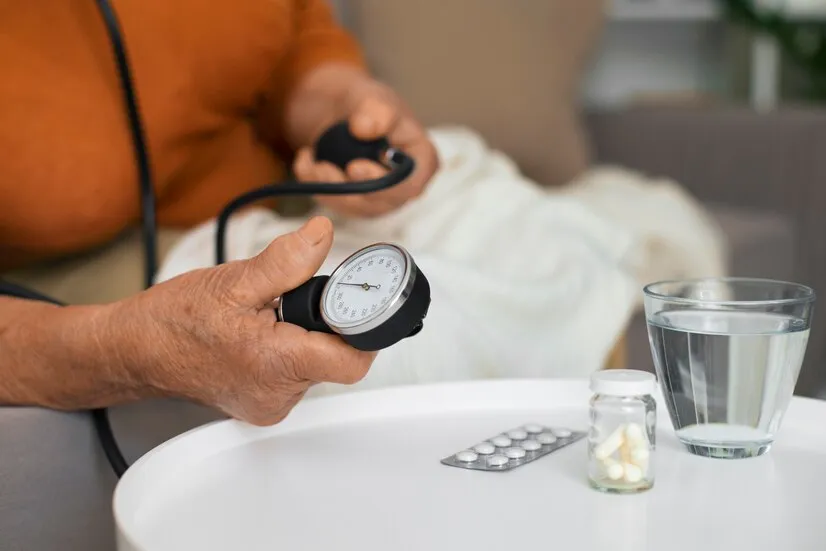High blood pressure (hypertension) is often called the “silent killer” because it typically has no symptoms but can lead to serious health complications if left untreated. According to the American Heart Association, nearly half of American adults have hypertension, yet many remain undiagnosed or untreated. For those who are diagnosed, blood pressure medication becomes a crucial part of managing this condition and preventing life-threatening consequences like heart disease, stroke, and kidney failure.
However, concerns about side effects of blood pressure medication prevent many patients from starting or properly adhering to their prescribed treatment. This comprehensive guide will explore everything you need to know about high blood pressure medication side effects, including:
✔ Detailed breakdown of common and rare side effects
✔ In-depth look at different classes of blood pressure drugs
✔ Strategies to minimize and manage side effects
✔ When to seek medical attention for possible side effects of taking blood pressure medication
✔ Alternative treatment options
Understanding Blood Pressure Medications: How They Work
Blood pressure medications, also known as antihypertensives, work through various mechanisms to help lower blood pressure and reduce strain on the heart and blood vessels. The American College of Cardiology recognizes five main classes of blood pressure medications, each targeting different physiological pathways:
-
Diuretics (“water pills”) – Increase urine output to reduce fluid volume
-
ACE inhibitors – Block angiotensin-converting enzyme to relax blood vessels
-
ARBs (Angiotensin II Receptor Blockers) – Prevent blood vessel constriction
-
Calcium channel blockers – Relax arterial muscles
-
Beta-blockers – Reduce heart rate and cardiac output
Most patients require a combination of medications to achieve optimal blood pressure control. The choice of medication depends on factors like age, race, other health conditions, and potential side effects.
Comprehensive List of Blood Pressure Medication Side Effects
While side effects of blood pressure medication vary by drug class and individual sensitivity, here’s an expanded look at potential reactions:
Common Side Effects Across Most Medications
-
Dizziness or lightheadedness (especially when standing)
-
Fatigue or weakness
-
Headaches
-
Nausea or stomach upset
-
Dry mouth
-
Mild swelling in extremities
Class-Specific Side Effects
Diuretics (Thiazide and Loop Diuretics)
-
Frequent urination (particularly in first few weeks)
-
Electrolyte imbalances (low potassium, sodium, magnesium)
-
Increased blood sugar levels
-
Gout flare-ups (due to higher uric acid)
-
Photosensitivity can be a possible side effect of some medications that treat high blood pressure. (increased sunburn risk)
-
Erectile dysfunction (in about 10% of male patients)
ACE Inhibitors
-
Persistent dry cough (in 5-20% of users)
-
Metallic taste in mouth
-
Skin rash or itching
-
Angioedema (dangerous swelling of face/throat – rare)
-
Increased potassium levels
ARBs (Angiotensin II Receptor Blockers)
-
Dizziness
-
Muscle pain or cramps
-
Insomnia
-
Digestive issues (diarrhea or indigestion)
-
Back pain
Calcium Channel Blockers
-
Swollen ankles/feet (peripheral edema)
-
Constipation
-
Flushing/warm sensation
-
Gum overgrowth (with long-term use)
-
Heart palpitations
Beta-Blockers
-
Cold hands and feet
-
Sleep disturbances/nightmares can occur as possible side effects of some treatments.
-
Depression or mood changes
-
Worsening of asthma symptoms
-
Reduced exercise tolerance
Managing Blood Pressure Medication Side Effects: Practical Solutions
Experiencing side effects from blood pressure medicine doesn’t necessarily mean you need to stop treatment. Many reactions diminish over time or can be managed with simple strategies:
For Dizziness/Lightheadedness
-
Rise slowly from sitting/lying positions
-
Increase fluid and salt intake (if approved by doctor)
-
Take medication at bedtime instead of morning
For Dry Cough (ACE Inhibitors)
-
Try throat lozenges or honey
-
Switch to ARBs if cough persists beyond 4 weeks
-
Stay well-hydrated
For Swollen Ankles (Calcium Channel Blockers)
-
Elevate legs when sitting
-
Wear compression stockings
-
Reduce salt intake
-
Ask about adding a low-dose diuretic
For Fatigue (Beta-Blockers)
-
Take medication in the evening to control blood pressure
-
Gradually increase physical activity
-
Ensure proper sleep hygiene
General Tips
-
Never stop medication abruptly – Can cause dangerous BP spikes
-
Keep a symptom diary – Helps doctor adjust treatment
-
Consider timing changes – Some work better at night
-
Stay hydrated – Helps with many side effects
When to Seek Immediate Medical Attention
While most side effects of blood pressure medication are manageable, some require urgent care:
🛑 Difficulty breathing/swelling of face/throat (sign of angioedema)
🛑 Fainting or severe dizziness
🛑 Heart rate below 50 beats per minute
🛑 Severe muscle weakness or cramps
🛑 Chest pain or irregular heartbeat
🛑 Yellowing of skin/eyes (jaundice)
These could indicate serious complications requiring immediate medical intervention.
Alternative Approaches to Blood Pressure Management
For patients who struggle with side effects of blood pressure medication, several alternatives exist:
Lifestyle Modifications
-
The DASH diet is recommended to help treat high blood pressure. (Dietary Approaches to Stop Hypertension)
-
Regular aerobic exercise (150 mins/week)
-
Stress reduction techniques (meditation and yoga can help control blood pressure)
-
Limiting alcohol and caffeine
-
Smoking cessation
Supplement Options
-
Coenzyme Q10 (may help with medication side effects)
-
Magnesium (natural calcium channel blocker)
-
Omega-3 fatty acids may help lower your blood pressure
-
Garlic extract
Note: Always consult your doctor before adding supplements, as some can interact with medications.
Device-Based Therapies
-
Renal denervation (for treatment-resistant hypertension)
-
Baroreceptor activation therapy
Conclusion: Balancing Risks and Benefits
While blood pressure medications can cause side effects, their benefits in preventing stroke, heart attack, and kidney disease far outweigh potential risks for most patients. The key is:
✔ Starting with lowest effective dose
✔ Regular follow-up with your doctor
✔ Patience during adjustment period
✔ Open communication about side effects
At LocalMD NYC, our specialists work closely with patients to find the most effective high blood pressure treatment with the fewest side effects. If you’re struggling with medication side effects or uncontrolled hypertension, schedule a consultation today for personalized care.
Frequently Asked Questions (Expanded)
1. How long do blood pressure medication side effects typically last?
Most initial side effects (like dizziness or fatigue) improve within 2-4 weeks as your body adjusts. Some (like dry cough from ACE inhibitors) may persist and require medication change.
2. Are there any blood pressure medications with no side effects?
All medications carry some risk of side effects, but newer ARBs like telmisartan often have excellent tolerability profiles with minimal side effects.
3. Can I take natural remedies instead of blood pressure pills?
While lifestyle changes help, most patients with true hypertension need medication. Natural remedies alone are rarely sufficient for proper blood pressure control.
4. Why do I feel worse after starting blood pressure medication?
Your body needs time to adjust to lower BP levels. Temporary fatigue or dizziness often means the medication is working to normalize your circulation.
5. How can I tell if side effects are from my medication or another health issue?
Keep detailed notes about when symptoms occur in relation to dosing. Your doctor may recommend temporarily stopping the medication (under supervision) to identify the cause.
6. Do blood pressure medications cause long-term damage?
When properly monitored, these medications protect your organs long-term. Regular blood tests check for any concerning changes in kidney function or electrolytes.
7. Can side effects get worse over time?
Some (like electrolyte imbalances from diuretics) may develop gradually, highlighting the importance of regular doctor visits for monitoring.
8. Are there blood pressure medications safe for pregnancy?
Methyldopa and labetalol are preferred during pregnancy. ACE inhibitors and ARBs must be avoided as they can harm fetal development.
For personalized guidance on managing high blood pressure medication side effects, contact the experts at LocalMD NYC today. Our team specializes in creating customized treatment plans that maximize benefits while minimizing discomfort.






